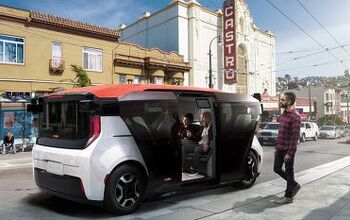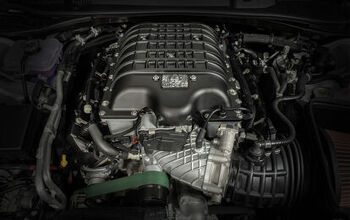Editorial: Bailout Watch 349: Price Conquers All
My five-year-old looked into the bag and spied the chocolate-covered strawberry. “Just one?” she asked with equal parts indignation and incredulity. “That cost me six bucks,” I responded defensively. “I wish they were cheap,” Lola said as the treat succumbed to dental destruction. “Then we could have lots.” And there you have it: proof that price conquers all. If Godiva wants to sell me a dozen chocolate strawberries, all they have to do is lower the price. Dramatically. Of course, they can’t do that. Ingredients, labor, transportation, administration, marketing, rent, fancy bags– it all adds up. By the same token, there’s only one way automakers seeking to sell vehicles cars in today’s market can stimulate sales: slash their prices by 50 percent or so. Of course, they can’t do that. Or can they?
If GM and Chrysler declare bankruptcy on Monday, they can sell their cars for whatever the market will bear. Which, at this point, would be a lot less than it costs to make them. Same old, same old. The ailing American automakers have been selling cars at a loss for over a decade. Even so, The Mother of All Fire Sales would mean the end of Chrysler and GM as we know them. Without any pretense of profit, the whole house of cards would collapse. Tens of thousands of jobs would disappear. But the price collapse would clear the lots and get the U.S. new car market back in gear.
Ask a five-year-old: everything sells at a price. The U.S. economy could be in a full-scale depression and new cars would still sell– if they were cheap enough. Anyone fancy a Chevy Malibu for $10k? Or a Jeep Cherokee for $12k? On the negative side, ultra-cheap cars would kick residual values off a cliff, locking even more people into their current whip. After the initial bonanza, the new car market may take a long time to recover.
On the positive side, the fire sale would provide access to better quality cars for a lot of low income buyers. Parts makers, service providers, gas stations– they’d all be better off. As supply lowered to demand, and then eventually recovered, the remaining automakers would benefit. Not to mention the profits provided by an industry-wide labor cost reduction (i.e. the disappearance of the United Auto Workers).
Yes, well. For reasons that will perplex historians for decades, President Bush decided to turn his back on free market principles and bail out the U.S. auto industry. As a result, the taxpayer is now supporting the price of automobiles.
So far, Uncle Sam has committed roughly $50b to the U.S. car industry. Let’s say ’09 sales clock in at 10m units. That’s a $5k subsidy per car. That’s if you spread the sales amongst all the companies offering new cars for sale in the U.S. If you assume that the domestics get the lion’s share of the bailout bonanza, and round-up their market share to 50 percent, that’s a whopping $10k per car.
If the total federal swag swells to $100b– a credible enough prediction when you add in big bucks for battery research, various tax credits for alt power vehicles, more “loans” for GM, Ford’s line of credit, suppliers’ call on the public purse, money for formerly captive credit companies, etc– we could be looking at a $20k per car federal price support. Add in another $50b– well, you can see where this is going.
Truth be told, your taxes are paying people to build cars that no one wants. Or, if you factor in the extended holiday break, we’re paying people to not build cars that people don’t want.
Perception gap be damned; Detroit’s cars aren’t fundamentally undesirable. They’re just too expensive. The bailout has singularly failed to change that fact. Nor will it. But that’s how government works: whatever it touches become less efficient. And there are other costs…
When the laws of supply and demand operate in a relatively unmolested marketplace, the consumer has the final say on a product’s worth, and the company’s survival. Now that GM and Chrysler have latched onto the federal teat, they are destined to be [even more] disconnected from consumer demand.
In fact, GM and Chrysler are no longer answerable to the consumer. Forget “viability.” They must now satisfy politicians rather than the “end user.” Who knows what harm these pols will inflict on the automakers– and the car market in general– in the name of political correctness? American Leyland, here we come.
Yes, yes. Politicians already call the shots, what with Corporate Average Fuel Economy standards, E85 subsidies, safety, etc. But even those who favor government fiat in such matters must surely realize there’s a line that should not be crossed. It’s one thing to regulate, another to control the means of production. Or, as Lola said, “does anyone else make chocolate strawberries?”
More by Robert Farago
Latest Car Reviews
Read moreLatest Product Reviews
Read moreRecent Comments
- TheEndlessEnigma Of course they should unionize. US based automotive production component production and auto assembly plants with unionized memberships produce the highest quality products in the automotive sector. Just look at the high quality products produced by GM, Ford and Chrysler!
- Redapple2 Got cha. No big.
- Theflyersfan The wheel and tire combo is tragic and the "M Stripe" has to go, but overall, this one is a keeper. Provided the mileage isn't 300,000 and the service records don't read like a horror novel, this could be one of the last (almost) unmodified E34s out there that isn't rotting in a barn. I can see this ad being taken down quickly due to someone taking the chance. Recently had some good finds here. Which means Monday, we'll see a 1999 Honda Civic with falling off body mods from Pep Boys, a rusted fart can, Honda Rot with bad paint, 400,000 miles, and a biohazard interior, all for the unrealistic price of $10,000.
- Theflyersfan Expect a press report about an expansion of VW's Mexican plant any day now. I'm all for worker's rights to get the best (and fair) wages and benefits possible, but didn't VW, and for that matter many of the Asian and European carmaker plants in the south, already have as good of, if not better wages already? This can drive a wedge in those plants and this might be a case of be careful what you wish for.
- Jkross22 When I think about products that I buy that are of the highest quality or are of great value, I have no idea if they are made as a whole or in parts by unionized employees. As a customer, that's really all I care about. When I think about services I receive from unionized and non-unionized employees, it varies from C- to F levels of service. Will unionizing make the cars better or worse?


































Comments
Join the conversation
scartooth said: You know what I agree I have been ranting but I do know one thing whther you find it ironic or not. I am really discouraged not only with American politicians who let this unfair trade practices to occur in the first place,but also those same foreign businesses that still want to keep parasiting off of the USA, with no regard to what they leave behind. Well, that goes both ways. If the US refuses to import poisonous dog food from China, China would retaliate by not allowing Buick to dump their junk to the Chinese car market. So, in a way, the pet owners are supporting the domestic auto industry. A trade war may not be in the best interest of the US. A stricter regulation may not be in the best interest of some of the American companies either.
Good job Thinx, I was wondering when someone was going to point that out. My only twist would be instead of a $3 Godiva bar, buy the $1 Dove dark chocolate bar or the white chocolate bar with the rice krispies in it.